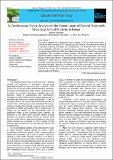| dc.contributor.author | Migunde, Quinter | |
| dc.date.accessioned | 2021-07-21T07:04:22Z | |
| dc.date.available | 2021-07-21T07:04:22Z | |
| dc.date.issued | 2021 | |
| dc.identifier.uri | https://repository.maseno.ac.ke/handle/123456789/4185 | |
| dc.description.abstract | This article presents the confirmatory factor analysis of the 20 item career locus of
control scale with a sample of 370 secondary school students. The instrument consists of
4 subscales measuring Internality, Luck, Helplessness, and Powerful Others. The overall
internal reliability of the locus of control scale was satisfactory. The current study tested
six models and verified four of the six models. External locus of control scores correlated
significantly with measures of career decision self-efficacy, career indecision and
vocational identity. Internal locus of control scores correlated significantly with career
decision making self efficacy. Significant gender differences were noted in most of the
subscales of career locus of control with males scoring significantly higher on the
subscales measuring externality and females scoring significantly higher on the subscales
measuring internality. Age was not related to any of the sub scales. The current study
provides the validity data for the career locus of control scale using a Kenyan sample.
Based on the results, other researchers may use the instrument to measure the career
locus of control of Africans. | en_US |
| dc.publisher | Elixir International Journal | en_US |
| dc.subject | Locus of Control, Career Decision Self-efficacy, Career Indecision, Gender and Confirmatory Factor Analysis. | en_US |
| dc.title | A confirmatory factor analysis of the career locus of control scale with secondary school students in Kenya | en_US |
| dc.type | Article | en_US |

